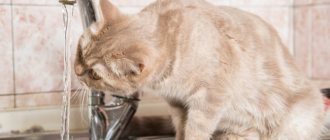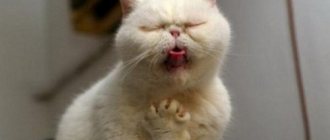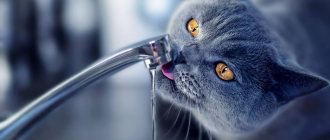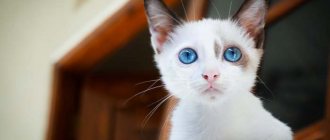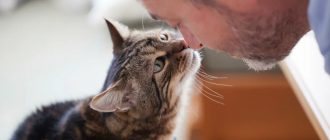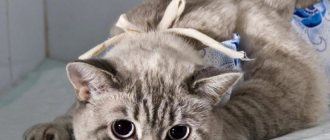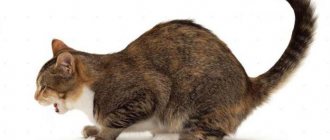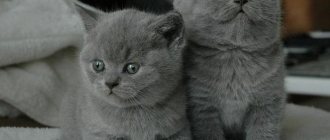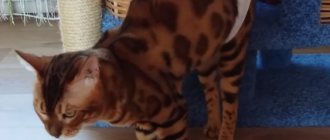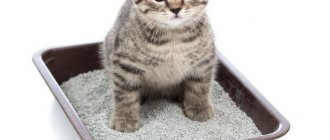If your cat is not eating or drinking, it is important to determine the problem. This behavior of these four-legged pets occurs for a number of reasons. They usually indicate that something is wrong in the cat's life. Sometimes animals can be picky eaters and demand delicacies. Often there is nothing serious in this situation and the problem can be solved with simple steps. However, a prolonged period of not eating can indicate dangerous pathologies and should be taken seriously.
The animal refuses food
You need to know the most common reasons why your cat won't eat in order to know how best to help your cat get back to normal. It is important for every furry owner to see their pet healthy and energetic. And this is impossible without normal, nutritious nutrition. Let's look at the most common reasons why there are deviations from the norm in a pet's behavior. The information provided will help owners of four-legged animals keep them in good conditions and eliminate problems in a timely manner.
Common Causes
Is your cat not eating or drinking or has it lost its appetite? This may be due to stress caused by, for example, moving to a new home, adding a dog to the family, or traveling to the veterinarian to get the cat's vaccinations. All these minor cases resolve themselves. If such situations arise, it is enough to give the animal time to recover. After all, an animal, like a person, experiences a variety of emotions. He may be happy or sad. Some problems worry him very much. During periods of stress, you should emphasize your friendly attitude towards your pet, then he will calm down faster and return to normal life.
To promptly determine the cause of this condition, when the cat does not eat or drink, the owner of a four-legged friend needs to pay attention to his pet every day. You can usually sense right away that something is wrong. Then you need to carefully observe the cat for a certain period of time.
Prevention measures
Not all situations can be foreseen by a cat owner, but there is much he can do to prevent a deterioration in the pet’s well-being:
- keep water and food bowls clean;
- transfer your pet to a new diet gradually (over 7–10 days);
- prevent stressful situations and prepare your pet for them in advance (if they are predictable - an exhibition, moving) using special medications;
- protect your pet from contact with stray animals; regularly carry out antiparasitic treatment (once every 3 months);
- Once every 10 days (and during shedding - up to 2 times a week), comb your pet to reduce the risk of hair getting into the gastrointestinal tract.
When switching to a new diet, only 10% of the cat’s usual food is replaced daily.
Only careful attention to the animal will allow the owner to notice symptoms of ill health in time. If your pet does not eat or drink or shows signs of poor health, then there is no need to treat it at home. First of all, you should contact your veterinarian so that he can identify the cause of the cat’s condition, and then prescribe adequate measures to treat the pet.
Why the cat doesn't eat: identifying the reasons
There are many reasons why a cat won't eat or drink anything. Then the owner must pay special attention to her behavior to understand the severity of the problem. Probably, after a few days of observing the cat, the owner will understand what is happening. If in doubt, you can always consult your veterinarian.
Like humans, animals, when they do not consume enough calories, must burn excess fat stores for energy. If your cat doesn't eat or drink anything, or eats longer than usual and begins to lose weight, this is a clear sign that she is not getting enough healthy food.
How many days can a cat live without food and water?
Lack of water is more detrimental to a pet than refusal of food. An animal can live without obvious health consequences for no more than 2 days.
It has been observed that cats can live without water for up to 5 days. But at the same time, they will already experience irreversible changes in the functioning of organs and systems (primarily cardiovascular, urinary and nervous).
Cats can live up to 10 days without food if they constantly drink water. If the animal does not eat or drink, then after 5 days health problems will begin, including failure of vital organs (primarily the kidneys).
Rapid weight loss is very dangerous
Rapid weight loss is very dangerous for a cat. If this occurs, it is important to contact your veterinarian as soon as possible. Protein is used to convert fat stores into energy. This process occurs in the liver. Sudden weight loss leads to the fact that all the protein is used up. This can lead to a life-threatening condition called lipidosis in cats, which can lead to liver failure if left untreated. Early signs of liver lipidosis include refusal to eat. If left untreated, late stage symptoms such as jaundice, drooling, seizures and even coma begin to appear.
The only known cure for this disease is increased enteral nutrition to combat the pathology and return the cat to a normal state, as well as fluid therapy to combat dehydration and electrolyte imbalance. Such measures can save your pet's life.
Stressful situations
Cats are very sensitive animals; they, like humans, are capable of experiencing feelings such as sadness, excitement, and fear. Even reorganization of their permanent habitat, home renovations, or a new pet can cause stress for them. Not to mention the absence of the owner or when she was sterilized. If a cat does not eat under such circumstances, it is possible that it is in a state of extreme stress.
Of course, the reasons may not be very significant, but only from a human point of view, such as a small quarrel, guests. In such an environment, it is quite acceptable to refuse food for a day and have a depressed mood. It is advisable for the pet owner to first find out what affected the animal’s well-being and refusal of food, and if possible, eliminate it.
When correction of the situation is impossible, for example, in the absence of the one the cat loves and other factors, then time and attention to the animal from the owner is needed. You may even need to consult a specialist, as well as use sedatives for the animal. An attentive and kind attitude on the part of the owner, playing games - in a word, good emotions - help to rectify the situation and overcome stress. Also, do not forget that stress can also be a harbinger of the development of a disease or an exacerbation of a chronic disease.
Why does a cat lose its appetite: stress?
Let's look at the most common reasons why a cat doesn't eat or drink and is lethargic. The most common of these is stress. Most cats are sensitive to changes in their environment, such as a new home, a new owner, or a new addition to the family such as a baby or dog.
Stressful conditions are also typical for humans, and they may also lose their appetite and eat much less. Then changes in the body will also be observed. Therefore, it is important to communicate with your cat and give it a lot of attention. Then she will quickly return to normal life.
Reasons why a cat may lose appetite
Desire is natural for any living being. Food provides energy to the body not only for activities directed outward (any movement), but also for the functioning of internal organs. Therefore, not eating for long periods of time is detrimental to health.
And then you notice that your pet, who until this moment was active and ate according to a schedule, suddenly ignores the bowl, and spends most of the time in a dormant state. It is necessary to determine the cause of the cat's changed behavior in order to provide her with the necessary help. Factors leading to refusal of food and water along with a decrease in activity may be psychological or medical.
Psychological
Psychological reasons include various stressful conditions for the animal:
- Moving to a new place of residence. Until the animal gets used to its new home, it may not only not feel the desire to eat, but also not go to the toilet. It is believed that an adult animal can behave this way for 2 days, and its condition does not require correction.
- Change of owner. Contrary to the prevailing opinion that a cat becomes attached to the house, and a dog to its owner, “their” person is also important for mustaches. Many cats choose their owner once and for all, and separation from him can cause deep stress for the animal.
- Change of diet. If a cat is suddenly switched to a new diet, it may refuse to eat at all, and lethargy will be a logical consequence of a weakening of the body.
- The appearance of a new pet or family member in the house, as well as guests (if they arrived for several days). Not all cats are friendly and easily accept any changes in their territory. Therefore, new people or animals are a stressful situation that you need to get used to. If people are noisy, and the animal psychologically suppresses the pet (for example, the owners got a dog that doesn’t like cats), then the stress can drag on.
In a new apartment, everything is still foreign to the cat; it needs time to get used to it.
Usually, even in a state of stress, a cat has a normal body temperature. But the appetite is completely absent, that is, the animal will not even touch the “yummy”.
A pet’s wet nose can serve as a relative indicator of general health (however, after sleep it can be dry, which is also the norm).
Medical
Another group of reasons for feeling unwell and refusing to eat is associated with the development of a disease. The main factors may include:
- Infectious and inflammatory diseases accompanied by fever. When fighting an infection, the body mobilizes all its reserves, so a pet may indeed not eat or drink for several days (just like a person, when he feels unwell, may not feel either the need for food or the desire to eat).
- Diseases of the urinary system. They are mainly associated with the formation of kidney stones and their movement through the ureters or blockage of the latter. The animal may experience severe pain and not approach the bowl, preferring to lie in a secluded place.
- Poisoning or gastrointestinal disorder. A pet can be poisoned not only by low-quality food, but also by household chemicals. Walking pets have a high risk of eating some poisonous insect or mouse, which in turn may already be poisoned. Against the background of intoxication of the body, the cat does not feel the desire to eat or drink, but it will have other symptoms (fever, vomiting, diarrhea).
- Injuries. Most often, injuries are manifested visually - the animal limps, experiences pain when moving (it may scream sharply or even bite when trying to pick it up). A type of injury may be a foreign body getting stuck in the throat. But even then the pet will cough, he may vomit, or wheeze when breathing.
- Diseases of the gums, teeth, and oral cavity. At the same time, the animal does not eat or drink simply because it hurts to do so. Older cats may refuse solid food due to their inability to chew it.
Loss of appetite and lethargy may also be caused by:
- helminthic infestations;
- infection with ectoparasites (fleas, subcutaneous ticks);
- allergic reactions.
During the period of sexual heat and estrus, female cats may not eat for several days.
Medical causes are very diverse, each with specific symptoms. Only a veterinarian can accurately establish a diagnosis, and sometimes solely based on the results of tests and examinations. Therefore, in this case, you cannot self-medicate; it is better to rush to see a specialist.
The owner’s main task is to observe the animal and record various events that occurred before the change in the pet’s behavior and could play a role in its current condition. All this information will be needed at an appointment with a veterinarian in order to most fully describe the clinical picture of the cat’s well-being.
In kittens
In small kittens, the cause of lack of appetite and lethargy can be any infectious disease, as well as parasitic infestations (flea infestation can even cause severe anemia, which practically never happens in adult animals). For a small organism, this condition is more dangerous and can be fatal due to an imperfect immune system, faster dehydration and weakening of the body.
But stressful situations usually do not have a strong impact on children. They adapt much faster to any changed conditions and, on the contrary, show increased curiosity. And if symptoms of food refusal are observed for more than a day, then you should look for another reason for this.
Video: why a cat refuses to eat
Food Features
Sometimes cats are allergic to the material the bowl is made from. Other problems with food dishes include dirty containers, reluctance to eat from a metal bowl because it becomes electrified, or simply the presence of another pet near the feeder. Some cats do not like the presence of their owners or other pets when they are about to enjoy food.
What to do if a small kitten cannot eat and drink on its own?
It happens that a little purr is separated from its mother cat too early. Experienced breeders of purebred animals give the kitten to new owners no earlier than 3 months of age, when it already knows how to eat on its own and is accustomed to a certain food. If the kitten was taken away from the cat when it was very tiny or the baby was simply found on the street, it is likely that he simply has not yet eaten anything other than his mother’s milk. The baby doesn't know how to lap from a bowl. Moreover, he has no habit of drinking water.
Such a cat will have to be fed milk from a pipette or bottle with a nipple. Moreover, it is recommended to use a special cat's milk substitute. Then you can gradually teach the kitten to lap from the bowl and eat wet food. A good way is to offer the baby food from your hand, sometimes this helps kittens start eating new food.
Disease
There are many diseases that can affect a cat's nutrition and well-being. Among the most common pathologies, kidney problems should be noted. A similar condition can occur with urolithiasis and when foreign objects enter the esophagus.
If your cat eats less, you need to monitor it. Sometimes there is lethargy, lack of purring, when the cat curls up into a ball and retires. You can hear a hissing sound when you try to pick up the animal or a squeak. Then the animal can hide in a box and not strive to communicate. Sometimes the cause of illness can be feline distemper.
Feline distemper
If your cat doesn't eat, doesn't drink, and is vomiting, these may be symptoms of distemper. The disease is transmitted from infected animals. It is especially dangerous if the animal brought it from a street walk. Sometimes you can infect an animal on public transport. Veterinarians do not recommend getting a pet earlier than a year later if there was already a cat in the house who was sick with distemper and died from this disease.
To treat the disease, it is important to consult a veterinarian. If the animal does not eat, does not drink, the cat vomits, its body becomes dehydrated very quickly. In such a situation, it is important to show your pet to the doctor. Self-medication will not lead to anything good.
The veterinarian will prescribe intramuscular injections of antibiotics and medications that will help relieve the feeling of nausea. Under no circumstances should you leave your pet without medical care, otherwise death is guaranteed. In addition, if there are other pets at home, they are also at risk of becoming infected.
When not to worry
Of course, it's hard to watch when your beloved pet won't even look at his favorite treats. However, you don't always need to worry when your cat doesn't touch food for a relatively short time. In addition, if the animal appears healthy and reasonably active, it does not have a high fever or any symptoms of gastric or other disorders.
In order not to worry about your pet’s health and to know how long a cat can refuse food, thereby expressing its protest against a new diet or other stressful situations, look at the following data:
- for a young healthy animal, such a hunger strike does not cause significant harm to the body for up to five days;
- for a pet that is healthy, but is already many years old, this period is slightly reduced and is approximately two days;
- but for a kitten that is not yet six months old, such “stubbornness” regarding food intake cannot be harmless if it exceeds one day;
- an animal with any chronic disease, regardless of the stage or form in which the disease manifests itself, can go without food for up to two days.
Of course, these terms are conditional and can occur if the animal does not eat, but drinks a sufficient amount of liquid. But in any case, it is advisable to consult a veterinarian for advice, because refusal to eat may hide more serious reasons.
Vaccinations
Recent vaccinations are a very common reason why your furbaby loses his appetite. If the cat does not eat or drink and lies down, this is a typical situation that goes away 48 hours after vaccination. You need to watch out for an allergic reaction to the vaccine, which can cause more serious complications than slight drowsiness. This manifestation is normal for cats.
An allergic reaction will usually have obvious external signs such as hives and severe scratching, with loss of appetite being one of the secondary reactions. But all this does not mean that it is necessary to refuse vaccination, since side effects are rare. And timely vaccination could save millions of lives of pets. The same feline distemper mentioned above is more dangerous for unvaccinated cats. Vaccinations are especially important if the cat is taken outside for a walk and the pet comes into contact with other animals.
Other eating problems
Cats are much less likely to eat food if it is old, stale or cold. They are very similar to humans in that they like food that tastes good. If you store food in a humid or warm environment, it will age faster than food stored in a cool, dry place. Cooking small portions of food helps prevent food from spoiling.
Kidney disease
It happens that a cat sleeps, does not eat, does not drink if it has kidney disease. It may be the main reason why an animal refuses to eat. This especially applies to older individuals.
Kidney disease usually causes your cat to feel sick and possibly even vomit. The cat does not eat or drink and is lethargic. Only a veterinarian can diagnose kidney disease. If any of these signs are noticeable, you should immediately take your cat to the doctor. Most likely, you will need to perform an ultrasound examination.
The kitten does not eat or drink - what to do when to sound the alarm?
When finding out the reason for refusing to eat and drink, you should very carefully evaluate the condition and behavior of the kitten. If an animal simply doesn’t want to eat, that’s one thing. But the reluctance to drink water combined with general lethargy and apathy is a very alarming symptom.
The owner should be wary of the following:
• repeated vomiting, even from water;
• the kitten constantly lies down and does not get up, breathing heavily;
• the animal has cloudy eyes;
• the fur has become faded, matted, and looks unkempt;
• intense salivation;
• the kitten has a swollen belly, no stool for several days or, conversely, it has become frequent and loose;
• there is discharge from the eyes and nose.
The presence of one or more of these signs, coupled with the kitten’s reluctance to eat and drink, is a serious reason to urgently consult a doctor.
Gastrointestinal pathologies
Like kidney disease, gastrointestinal disease is a serious case that usually requires the expert care of a veterinarian. There are many pathologies such as pancreatitis, gastrointestinal infections, parasitic infestations, cancer, colitis and even foreign bodies in the form of a rope or part of a toy that can cause intestinal obstruction in a cat.
In this situation, a veterinarian should be consulted if any signs of gastrointestinal distress are observed, such as not eating for more than a couple of days, diarrhea, constipation, or excessive weight loss.
Problems with sterilized cats
Does your cat not eat or drink after sterilization? This cannot but cause concern among animal owners. Today, the sterilization process occurs quite safely, but the effects of anesthesia may persist for some time.
After the cat awakens from anesthesia, drinking water must be available to it. The recovery process will take from 8 to 12 hours. After this, the animal will return to its normal lifestyle. Before this, the animal may refuse food.
Sometimes the cat does not eat, does not drink, is sleepy, lethargic until her stitches are removed. All this time the animal must be under the supervision of a veterinarian.
To improve the animal’s condition, it is important to provide him with peace of mind and the opportunity to rest as much as he needs. Also, there should be no other animals nearby. They can injure the operated cat. It is important to wait until the postoperative suture heals.
Refusal to eat during the first day is normal. But if this condition continues for three days or more, complications may occur. Then it is important to seek medical help.
Your veterinarian may prescribe IV feedings as well as liquid broths that are poured into a dropper or syringe. After such a surgical intervention, you will need to give your cat food that is designed specifically for animals after sterilization. Then the pet will be provided with the necessary vitamins and microelements that will compensate for the peculiarities of its condition.
Age problems
At what age is a cat considered old? Today, these animals often reach the age of eighteen to twenty years. If an old cat is not eating or drinking, it is important to understand the reasons for this condition.
Perhaps the animal has one disease or several diseases at once. Older cats are not as susceptible to arthritis as dogs. But these four-legged animals often suffer from kidney diseases.
Signs of kidney problems include excessive drinking and urination in the animal, accompanied by a decrease in body weight. Also, straining when the animal cannot easily go to the tray can be considered a symptom of kidney disease.
If you have these symptoms, it is important to visit a veterinarian as soon as possible. At the same time, we must not forget about creating comfortable conditions for keeping the animal. An old cat should live in a warm place. Hypothermia is contraindicated for her, so drafts must be eliminated. The doctor will recommend the specific diet for such an animal.
Also, the reason for an old cat’s refusal to eat may be a weakened sense of smell and poor eyesight. These are age-related problems in pets.
